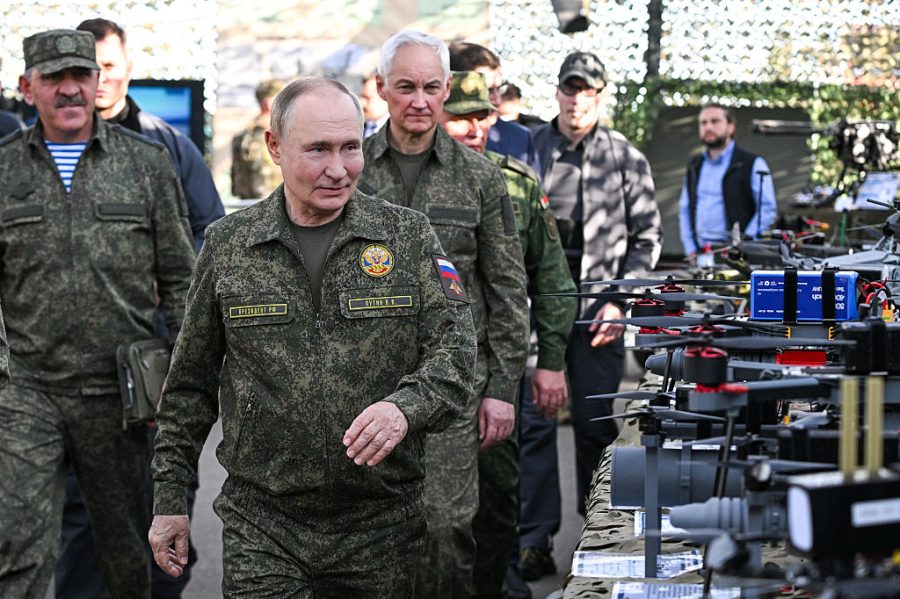At a time when Western commentators are tying themselves in knots trying to parse the ongoing Ukraine peace discussions, the Russian media is suddenly strikingly united in its coverage. There is a common misperception that, like their Soviet forebears, the Russian press simply reproduces some standard party line, day in, day out. In fact, there is often surprising pluralism, with different newspapers having their own interests and angles. However, the Kremlin does impose its will when it comes to especially important or sensitive matters, with editors receiving tyomniki, informal but authoritative guidance from the presidential administration on lines to take and topics to avoid. When the press is speaking in one voice, that voice is Putin’s.
A day of uncertainty followed when news of the proposed 28-point peace plan for Ukraine first dropped. But now, the Russian media is back in lockstep, providing a useful insight into what the Kremlin wants to communicate to both foreigners and its own subjects.
Ukraine, Europe and the US are being warned that Moscow is not desperate for a deal
In the heavyweight government paper Rossiiskaya Gazeta, Fyodor Lukyanov, one of the most prominent foreign policy scholars often deployed to put a gloss on the official line, contributes a piece under the headline ‘Realism and the Impossible: Why Ukraine won’t be forced to immediately accept the 28-point peace plan’. In it, he argues that ‘the primary means, frankly,’ for Russia to achieve its goals in the conflict ‘is military force’:
As long as hostilities continue, leverage remains. As soon as they cease, Russia finds itself alone (we harbour no illusions) in the face of coordinated political and diplomatic pressure.
It is hardly coincidental that this comes just as European leaders put forward their own version of the original plan, which keeps Nato membership open and punts key issues such as the exchange of territory to be resolved after negotiations have started, while demanding an end to the fighting as their precondition. The Russian press is united in – not necessarily groundlessly – regarding the European variant as a spoiler: why should Moscow pause its attacks and give Ukraine a chance to regroup, only to risk there being no agreement after months of fruitless filibustering on Kyiv’s part? As the business paper Kommersant puts it, ‘Kyiv’s European allies are seeking amendments to the Trump plan for Ukraine that will make it unacceptable to Moscow.’
In which case, the common message is that Russia is perfectly willing to keep fighting. Many papers quote Putin’s words from a televised meeting of the country’s security council on Friday, that while:
Russia is ready for peace negotiations, it is also satisfied with the current dynamics of the [special military operation], which are leading to the achievement of its goals by military means.
The implication is that until Putin knows that he is going to get at least his key demands from any agreement, he will continue to unleash his armies, missiles and drones on the Ukrainians. The nationalist Tsargrad news site, which has recently been implicitly critical of Putin, suggesting he should be even more aggressive, put it starkly:
Russia’s position hasn’t changed: if Zelensky doesn’t agree to Moscow’s terms, Russian troops will continue their offensive deep into Ukraine.
Just as Ukraine, Europe and the US are being warned that Moscow is not desperate for a deal, Russians are being prepared for disappointment. The newspaper Trud offers up upbeat bombast from Konstantin Kosachev, deputy speaker of the Senate, that the West has:
abandoned Ukraine… It can’t withstand continued military action without consolidated Western external support, which it no longer has. But it’s also not ready for negotiations, because they’ll have to be conducted from the position of the losing side, not the winner.
Most of the commentary is rather more sober, though. The business press may be eyeing up the possibility of sanctions relief, but in the main the papers are trying to strike a balance between caution and optimism. Gazeta.ru’s military observer may argue that ‘Ukraine should agree to Trump’s plan without conditions’, but there is absolutely no consensus that it will.
Some commentators suggest that Zelensky cannot risk alienating the nationalist wing at home by making any agreement, others that European leaders – who are undoubtedly being presented as the villains of the peace – will succeed in sabotaging the process. Noting that ‘senior EU officials have been diligently fanning the flames for the past few years’, Izvestiya nonetheless reassures its readers that ‘time is currently playing against the Europeans and Kyiv’.
This, after all, is the Kremlin’s main point: that Russia is winning regardless. To Ukraine and the West, it holds out the threat that if this round of negotiations fails, any future peace terms will be rather harsher. To Russians, it offers a prospect not just of peace, but of victory – so long as they stay the course.








Comments